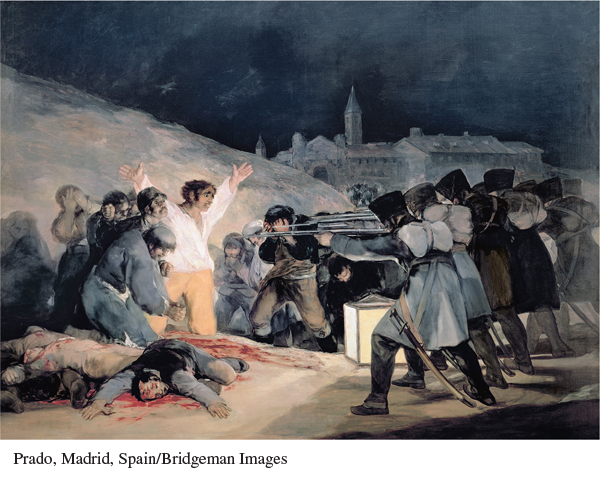A History of Western Society: Printed Page 637
A History of Western Society, Value Edition: Printed Page 609
A History of Western Society, Concise Edition: Printed Page 635
The Grand Empire and Its End
Increasingly, Napoleon saw himself as the emperor of Europe, not just of France. The so-
The impact of the Grand Empire on the peoples of Europe was considerable. In the areas incorporated into France and in the satellites (Map 19.2), Napoleon abolished feudal dues and serfdom to the benefit of the peasants and middle class. Yet Napoleon had to put the prosperity and special interests of France first in order to safeguard his power base. Levying heavy taxes in money and men for his armies, he came to be regarded more as a conquering tyrant than as an enlightened liberator. Thus French rule sparked patriotic upheavals and encouraged the growth of reactive nationalism, for individuals in different lands learned to identify emotionally with their own embattled national families as the French had done earlier.
The first great revolt occurred in Spain. In 1808 Napoleon deposed Spanish king Ferdinand VII and placed his own brother Joseph on the throne. However, a coalition of Catholics, monarchists, and patriots rebelled against Napoleon’s attempts to make Spain a French satellite. French armies occupied Madrid, but the foes of Napoleon fled to the hills and waged uncompromising guerrilla warfare. Spain was a clear warning: resistance to French imperialism was growing.

Yet Napoleon pushed on. In 1810, when the Grand Empire was at its height, Britain still remained at war with France, helping the guerrillas in Spain and Portugal. The Continental System was a failure. Instead of harming Britain, the system provoked the British to set up a counter-
Napoleon’s invasion of Russia began in June 1812 with a force that eventually numbered 600,000, probably the largest force yet assembled in a single army. Only one-
Leaving his troops to their fate, Napoleon raced to Paris to raise yet another army. Possibly he might still have saved his throne if he had been willing to accept a France reduced to its historical size — the proposal offered by Austria’s foreign minister, Prince Klemens von Metternich. But Napoleon refused. Austria and Prussia deserted Napoleon and joined Russia and Great Britain in the Treaty of Chaumont in March 1814, by which the four powers formed the Quadruple Alliance to defeat the French emperor.
All across Europe patriots called for a “war of liberation” against Napoleon’s oppression. Less than a month later, on April 4, 1814, a defeated Napoleon abdicated his throne. After this unconditional abdication, the victorious allies granted Napoleon the island of Elba off the coast of Italy as his own tiny state. Napoleon was allowed to keep his imperial title, and France was required to pay him a yearly income of 2 million francs.
The allies also agreed to the restoration of the Bourbon dynasty under Louis XVIII (r. 1814–1824) and promised to treat France with leniency in a peace settlement. The new monarch sought support among the people by issuing the Constitutional Charter, which accepted many of France’s revolutionary changes and guaranteed civil liberties.
Yet Louis XVIII lacked the magnetism of Napoleon. Hearing of political unrest in France and diplomatic tensions in Vienna, Napoleon staged a daring escape from Elba in February 1815 and marched on Paris with a small band of followers. French officers and soldiers who had fought so long for their emperor responded to the call. Louis XVIII fled, and once more Napoleon took command. But Napoleon’s gamble was a desperate long shot, for the allies were united against him. At the end of a frantic period known as the Hundred Days, they crushed his forces at Waterloo on June 18, 1815, and imprisoned him on the rocky island of St. Helena, off the western coast of Africa. Louis XVIII returned to the throne, and the allies dealt more harshly with the French. As for Napoleon, he took revenge by writing his memoirs, nurturing the myth that he had been Europe’s revolutionary liberator, a romantic hero whose lofty work had been undone by oppressive reactionaries.